Keeping chickens can be a great joy. Not only do hens provide fresh eggs on a daily basis. Well-fed chickens provide the world’s most widely consumed source of meat. Noisy roosters can be a downside to keeping a flock, but that’s no problem for heavy sleepers or an early riser. There are blessed (or cursed) people with the ability to sleep like the dead or rise with the lark. Other problems come with keeping roosters. Roosters are naturally aggressive, which is great for protecting your chickens. But they will also try to protect ‘their’ hens from you. But did you know attracting crows can protect chickens?
That’s right! Crows can act as protecting friends to chickens and scare away any threats or enemies. So how do you attract crow to protect your chickens? Glad you asked!
In this article, we’ll go over the best techniques for attracting crows to protect chickens. Let’s get started.
Attracting Crows to Protect Chickens
Crows are genetically classified as songbirds, but their harsh croaking songs would never sell out madison square garden. Crows usually flock together in a group. The ominous collective noun for crows is a murder. Despite a dark reputation, crows have quite a comical disposition.
They use their extraordinary eyesight and numbers to spot, intimidate, and even ridicule potential predators. Crows mob together to harass hawks, which could easily make a meal of a single member.
They will surround predators and squawk at them, warning all the surrounding prey of the danger. The crows almost make a game of seeing who can get the closest. It is difficult for a fox to execute his cunning while surrounded by a murder of crows screaming bloody murder.
The chickens instantly recognize these alarm calls, and they respond quickly. They seek shelter quietly without the mindless panic caused by a predator appearing suddenly in their midst. The crows’ alarm calls can also serve to alert you of a potential menace.
Author Note: There are a number of birds that will give a distinct call when they see a threat. Other birds and animals can heed these calls, but crows have a more direct approach. The way crows respond to a threat is helpful because they stay close to it.
If you go out to check what the noise is about, you will see them show you. They aren’t just shouting “danger, danger.” They are saying, “the danger is right here.” Almost invariably, the hunter will give up and search elsewhere for less well-guarded prey.
When chickens start making a fuss, usually it is too late to respond. Stealthy and airborne predators know their game well.
Why Do Crows Watch Over Chickens?
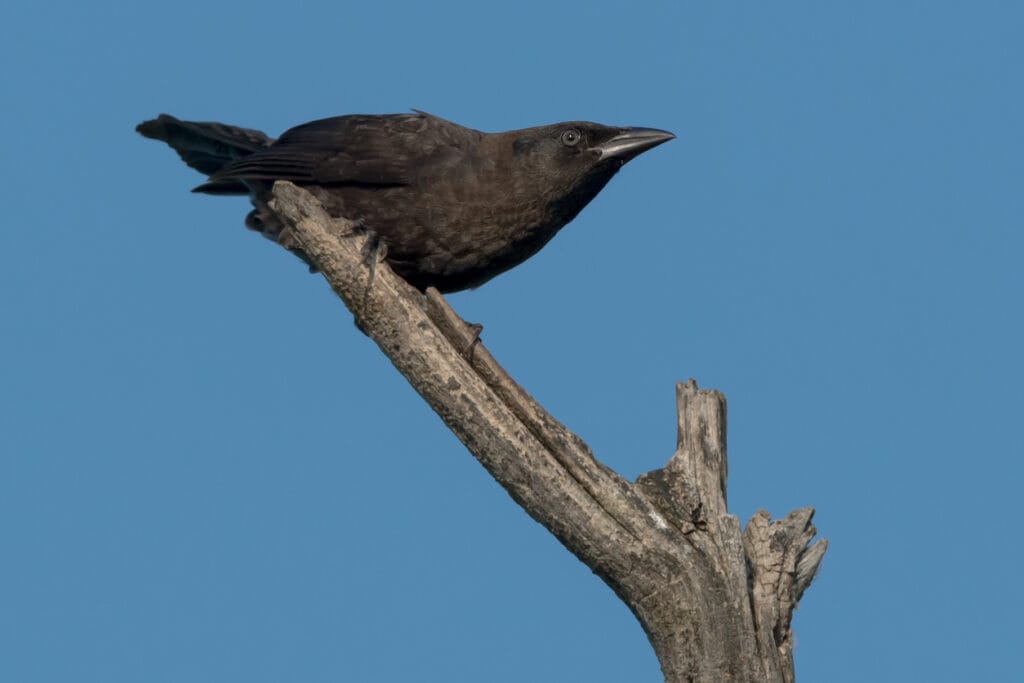
To have crows watching over your chickens might seem a bit odd. Especially since crows may eat eggs, chicks, and even small bantams. The truth is that it is extremely rare to see a crow attacking chickens. Even hatchlings with a watchful mother will be avoided for an easier meal.
In reality, sickly chickens are in far more danger from their own kind than from a crow. Chickens are merciless when it comes to illness. They will even kill members of their own flock if they are deemed unfit. A crow will happily dine on a chicken that has been killed by its own, though.
Crows eat a wide range of different food. These include grain, seeds, nuts, fruit berries, insects, rodents, other small animals, and hatchlings. Crows will also eat carrion when they can find it. They also use numbers and their tenacity to harass and bully larger predators into snatching a bite of a fresh kill.
Using Food to Attract Crows
Store-bought hanging bird feeders are better suited to smaller songbirds, and as such, crows tend to avoid them. Crows have large, sturdy beaks and the openings in a feeder are just too small for them to eat comfortably.
Crows can be funny about food that is laid out for them. But when you find fare they enjoy, they will often shun other offerings. They can even go so far as making noisy complaints that their favorite food isn’t available.
When trying to tempt crows, food to use includes dog or cat food (pellets or fresh), fruit, berries, eggs, peanuts, and uncooked popcorn. Crows might also appreciate scraps of raw and cooked meat.
Where Do Crows Eat?
While not exactly picky about what they eat, they can be choosy about where they eat. Crows naturally feed on the ground in the wild. If you want to take photos of them, an elevated platform is great to make them more visible. Just make sure it is easily seen from the sky.
Author Note: Feeding platforms should be well built and sturdy. An empty concrete birdbath works perfectly. You can also build a table, just ensure it has a lip around the edge. These messy eaters will scatter food all over the yard.
Crows and Chickens: Attracting Crows to Protect Chickens
Crows are very intelligent. They can recognize faces and even associate a vehicle with the driver. If you make an enemy of a crow, it will remember you and warn its friends that they cannot trust you.
If you have a chicken run and crows have become a nuisance by stealing eggs, and maybe even chicks, try to befriend them. Layout raw chicken and eggs for them to satiate their appetite, so they stay away from your birds.
How to Keep Crows Around
If you are attracting crows to your chicken run for the first time, try not to use raw chicken scraps or eggs. If the crows do not have a taste for it, try not to build one. That said, if they show an unhealthy interest in your birds or eggs, then cater for it.
You may find that crows prefer certain foods at different times of the year. Summer and fall are traditionally the best time for fruit and berries. Grains, nuts, and meat might be preferred through late fall and into winter. Dried mealworms and crickets might also turn out to be a spring favorite.
Making a Home for Crows
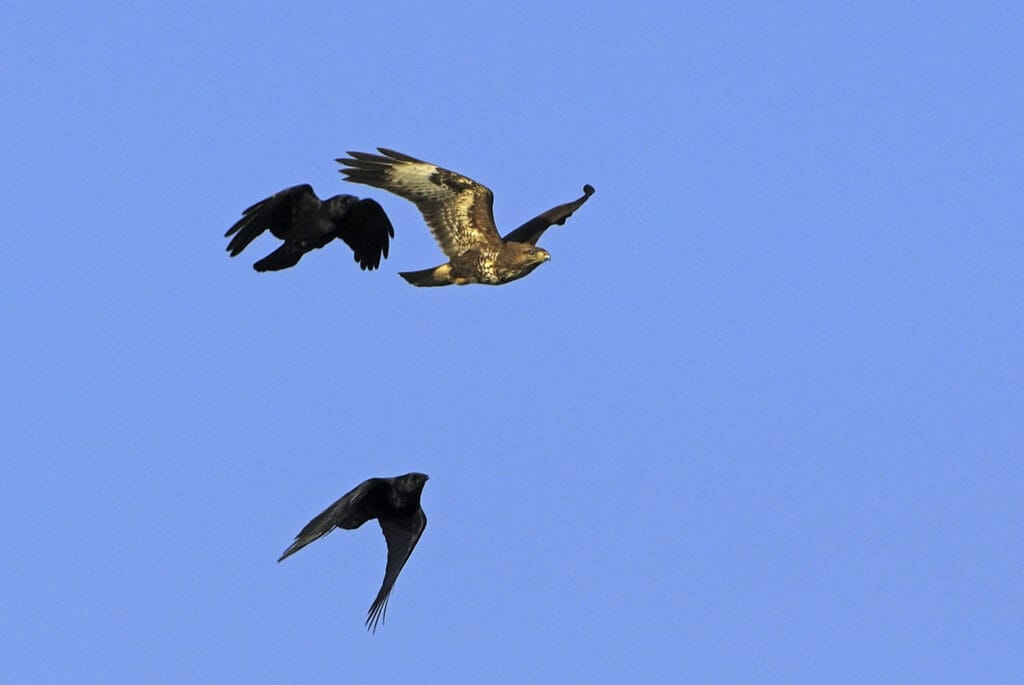
Crows don’t need much to keep them happy. You won’t need to build the nesting boxes or go to great lengths. Open space, a bath, a few places to perch, and some easy food will keep the crows coming back. Here are a few tips to help maintain the crows’ interest.
Get a Birdbath
One thing that all birds love is water, and crows are no different. Crows like a slightly deeper bird bath than most small songbirds. Crows like to bathe in groups with one or two lookouts. An ideal birdbath for crows is a long trough with water about three inches deep.
You must check a bath for crows regularly. Crows will often store food for later. These are usually bite-size morsels that the birds may offer to incubate mothers. As crows are carrion eaters, they will occasionally leave food for a few days.
Food is often left in the water to aid in softening it and help it rot. Crows may well enjoy the taste of aged food, much like humans with an aged steak. Remains removed before they putrefy, and you must change the water regularly, so it does not stagnate.
Build a Perch
Crows like a vantage point on which to perch. They also fly low and prefer open areas to a forest. Try to keep the area around your chicken run free of trees. A solution is to build a few perches around your yard.
Crows like to perch on horizontal branches and want enough space to be able to sit with their friends. You can use lumber to build a perch, but you can make old tree branches to add a rustic ornate look. Old wood will likely be inhabited by bugs and grubs for the crows to munch on too.
Remember that crows are sociable, and perches will need to support more than just one bird. A perch that supports four or five birds is great, but the more, the better. Try to make perches a minimum of six feet long.
Author Note: Keep perches within 25 feet of each other with a clear line of sight between them. This will allow larger flocks to maintain communication and watch over one another comfortably.
Build a few perches around your chicken run to allow the birds to find their perfect spot. This ideal location may change at different times of day as the sun moves through the sky. Perches are best placed between the chickens and natural cover that may hide approaching predators.
When placing perches, try to do so at a naturally quiet place in the yard. If you place a perch next to the driveway or garage, the sound of your engine will unnerve nearby crows.
Limit Noise
Crows may be raucous and noisy themselves, but other unnatural sounds spook them. An unlatched gate blowing closed will scare the birds off, as will wind chimes or bells. To ensure that your yard is well suited to attract crows, you should remove all sources of noise.
Shiny Objects and Decorations
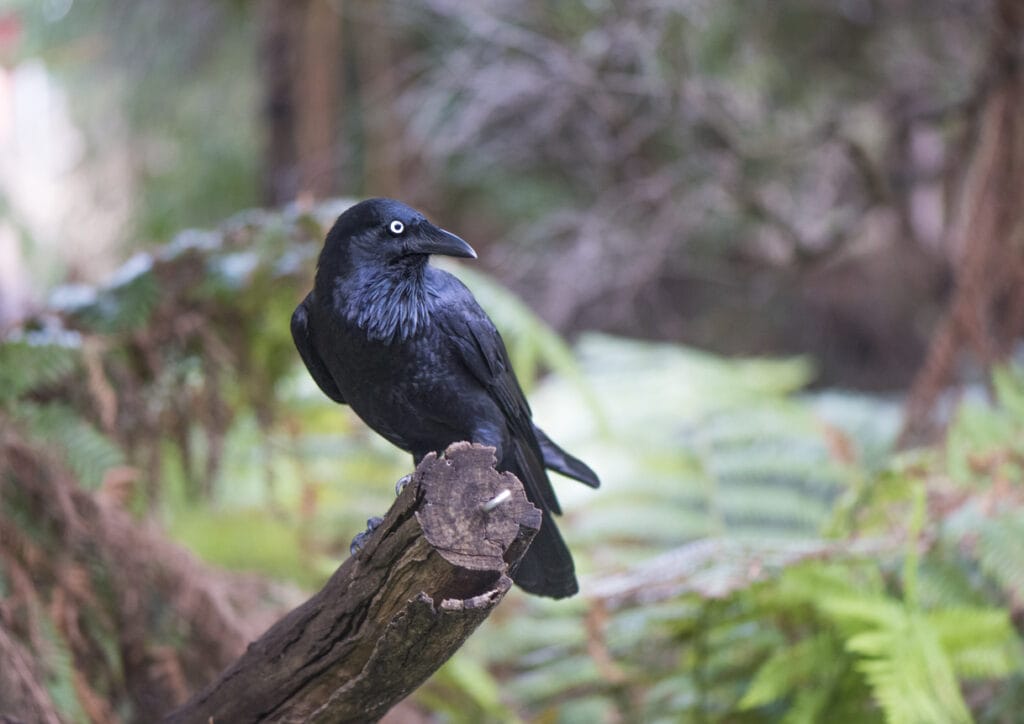
Crows are curious and intelligent and may peck at shiny objects. However, moving reflective objects will make them uncomfortable. If you have spinning or hanging decorations in the yard, this may disturb crows and other songbirds.
Use Decoys
Most garden decoys are used to dissuade unwanted visitors from your yard. Crows being sociable animals, will be drawn to a crow decoy. They take cues from other crows and check around a well-placed decoy to find a suitable roost.
Use a number of decoys for the best effect. Static decoys will draw the attention of a passing crow, but they are too intelligent to be fooled for long. Stage a scene where your decoys look like they are foraging, and add moving decoys to finish the display.
Imitate Calls
Crows, like most animals, communicate through sound, and they will be attracted by calls imitating their own. Crows have several calls with different meanings. For us to differentiate between them is tricky without technology or experience.
There are options for recreating the calls of crows. Reed calls are the traditional method, but now technology has provided solutions too. Some sound boxes emit several crow calls, which may have them flocking to your yard.
Get Into a Routine
Crows like routine and will recognize a schedule if you stick to one. Try to put out food at the same time each day, and the crows will come to expect you. Maintain this ritual for an extended period, and you will begin to earn a reluctant trust.
Conclusion
Building a symbiotic relationship with crows is very satisfying. Also, they provide security for your hens. Remember, crows are naturally wary, and one false move can destroy a relationship that has been months in the making. We hope you enjoyed this guide on attracting crows to protect chickens.
Fly high friends!
FAQ
Crows may scavenge on dead chickens, but they are unlikely to protect them. Crows are omnivores and will feed on a variety of food, including insects, seeds, and small animals.
Crows are attracted to a variety of food sources, but they are particularly attracted to food that is easy to access and abundant, such as garbage and scraps. They are also attracted to shiny objects and may be attracted to feeders with shiny metal parts.
Birds that will attack chickens include birds of prey such as hawks, eagles, and owls, as well as corvids such as crows and ravens. Other birds that may attack chickens include domesticated birds such as ducks and geese, and some species of gulls.
Yes, hawks can attack chickens, especially young or small birds. Hawks are birds of prey and feed on a variety of prey, including birds, small mammals, and reptiles. To protect chickens from hawk attacks, it is important to provide them with shelter and to limit their exposure to open areas where they may be more vulnerable to attack.
Yes, crows will eat chickens, especially if the chickens are dead or injured. Crows are omnivores and will feed on a variety of food, including insects, seeds, and small animals.
Crows may also attack chickens, especially if the chickens are small or vulnerable. Crows are known to attack and kill smaller birds and may view chickens as potential prey. To protect chickens from crow attacks, it is important to provide them with shelter and to limit their exposure to open areas where they may be more vulnerable to attack.
To prevent crows from stealing eggs, you can use predator guards, cover the eggs, move the eggs regularly, use scare devices, or cover the coop with bird netting. A combination of methods may be necessary to effectively prevent crows from accessing the eggs.
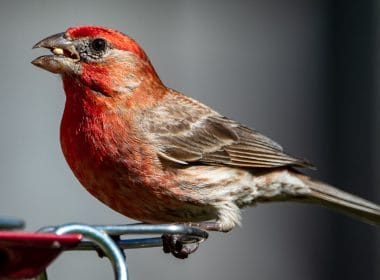

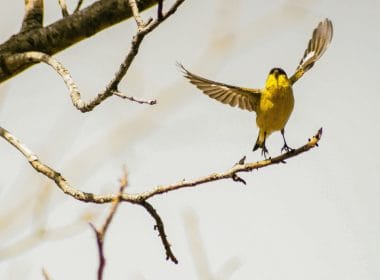

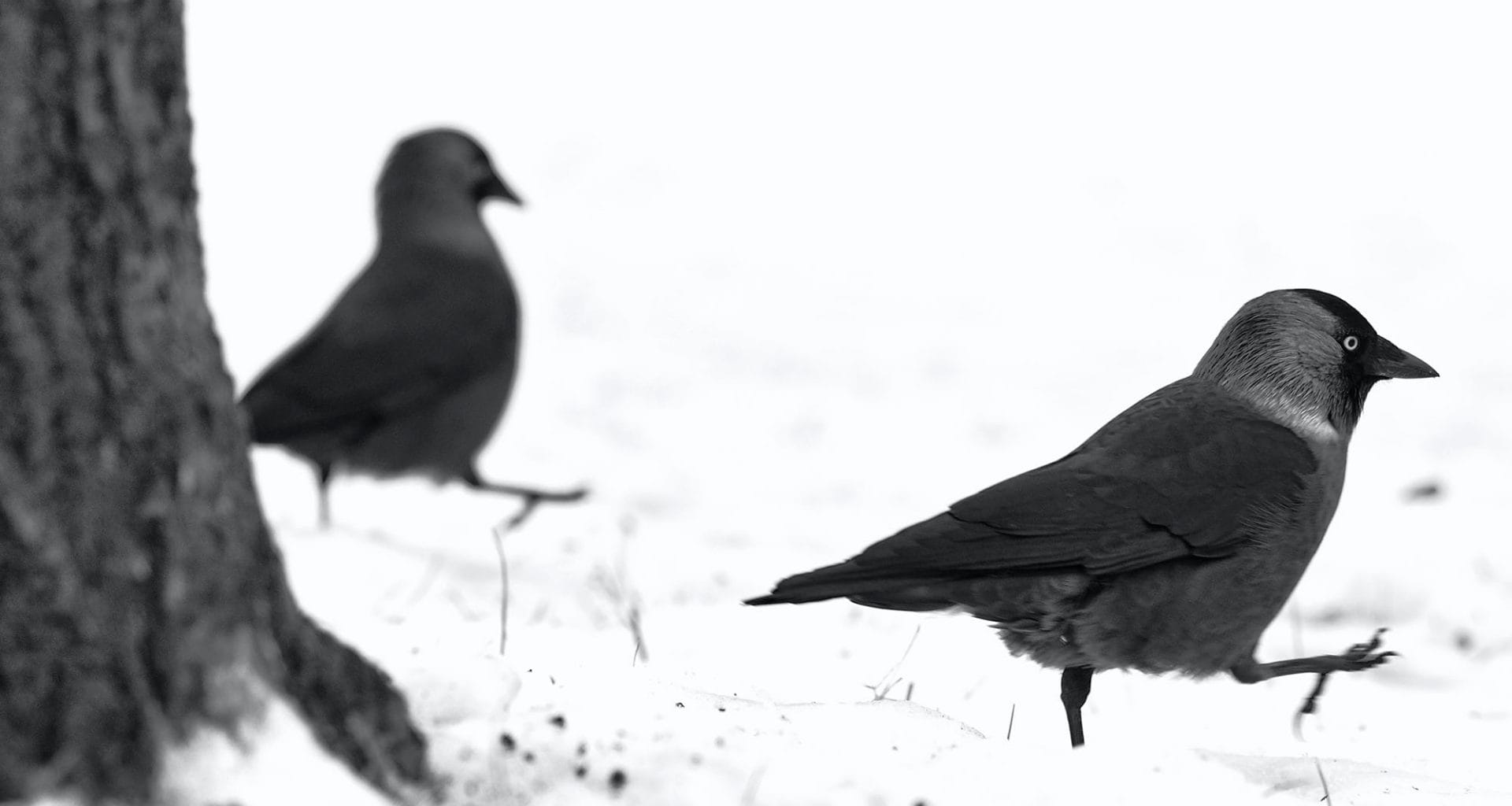
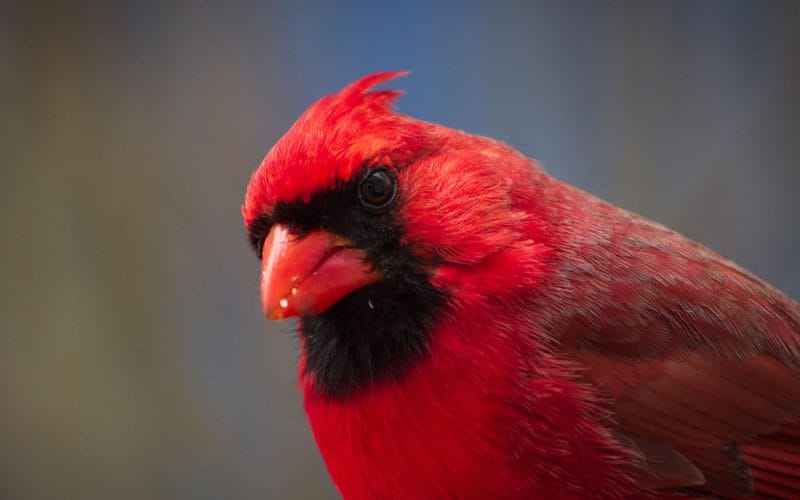
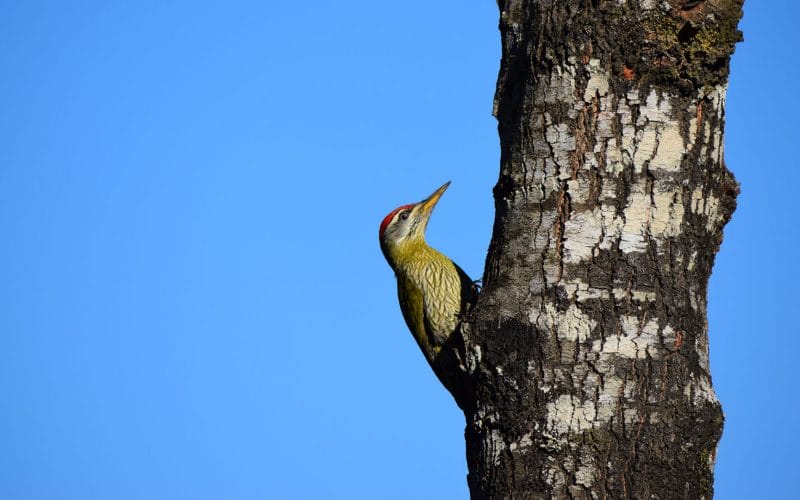
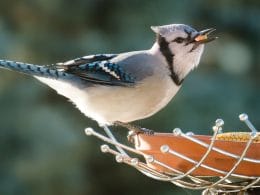
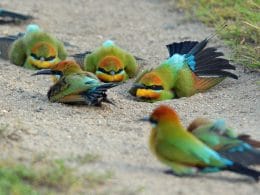


Crows really do protect chickens. I have observed it twice in the last year. The first time I actually saw the hawk glide down and hit the Rhode Island Red hen. All my chickens are pretty fat so he didn’t carry her away but feathers flew and the hen seemed stunned. The hawk came around for a second pass but before he could strike her again, two black missiles came streaking out of the trees in the yard and drove him off his path. Two more crows soon joined them followed by another pair. As the hawk was driven above the trees and over the forest, more crows joined until at least ten were weaving a “basket” of cawing protectors driving him away from the yard. I watched them continue to torment the hawk until they disappeared over the horizon. The Red was scraped and a little bloody on her back but recovered fine. That was about 18 months ago.
The second time was last month. My chickens were out in the yard for their afternoon grazing. I was keeping an eye on them until I fell asleep in my recliner by the window (yes, watching chickens can be very relaxing!). I was startled from my nap by the panicked squawking and thump of Flopsie, one of my more vocal and talented reds, hurling herself against the window. I looked outside and saw white feathers strewn across the yard. I knew something had gotten to Blondie, one of my Americanas. I ran out the door and immediately heard the raucous cawing of dozens of crows from the tree tops, moving away from the yard through the forest. I followed for a few hundred yards but they soon lost me as they drove their target deeper in the forest. I came back to the yard to determine Blondies fate and found her hiding under a trailer under a shed, bruised and with a few less feathers but OK. I didn’t witness the actual strike this time but I think the evidence is pretty convincing.
We now set out scraps in the morning for the crows and bring them in before letting the hens out after lunch. The crows seem to like this arrangement and are there to keep an eye on the girls in case I decide to take another nap!
This is actually really informative and cool to learn. I have some crowd around but not enough. Now I know I should try harder to bring them around. Thank you very much.